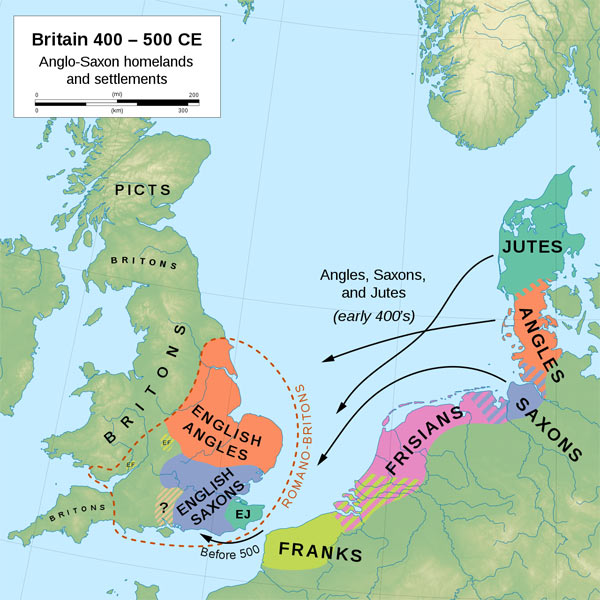Saxons

Anglo-Saxon homelands and settlement.
The Saxons (Lat. Saxones, Ger. Sachsen) were a Germanic people, whose name is usually derived from an old Teutonic word sahs, meaning "a knife", though some authorities believe it to be another form of Sasson = "the settled people". They were first mentioned by Ptolemy as dwelling in the south of the Cimbrian Peninsula. In the 3rd century a "Saxon League" or "Confederation", to which belonged the Cherusci, the Angrivarii, the Chauci, and other tribes, was established on both sides of the estuary of the Elbe and on the islands off the adjacent coast. During the reigns of the emperors Julian and Valentinian they invaded the Roman territory; but their piratical descents on the coasts of Britain and Gaul are far more famous.
In 287 Carausius, a Belgic admiral in the Roman service, made himself "Augustus" in Britain by their help; and about 450 they, in conjunction with the Angles, established themselves permanently in the island and founded the Anglo-Saxon kingdoms.
Before the 5th century they had settled along the North Sea coasts from the Elbe to the Loire, a part of what was later Flanders being called the "Saxon shore". But these Saxon settlements soon became absorbed in the kingdom of the Franks.
In Britain too there was a Saxon shore with its count. In Roman times the coastal districts of Britain from Brighton northwards to the Wash were called Litus Saxonicum, or Saxon shore. These localities were particularly exposed to the attacks of the Saxons from across the North Sea, and were placed under the authority of a special officer, the Count of the Saxon Shore. At home the Old Saxons enlarged their territory by conquest till it embraced all the lands between the Rhine and Elbe, the North Sea and the Harz Mountains.
Along with the Franks they destroyed the kingdom of the Thuringians in 531, and obtained possession of the land between the Harz and the river Unstrut; but this region too was forced to acknowledge the Frankish sovereignty. But the Saxons having thrown off the yoke, wars between the Saxons and the Franks were constant after 719; and the latter after 772 were, under the vigorous leadership of Charlemagne, generally successful, in spite of the determined opposition offered by Wittekind (or Widukind ). The desperate resistance of the Saxons was not finally broken until 804, though Wittekind submitted in 785. After the final submission the conquered people accepted Christianity, having before defended their heathen faith in conjunction with their freedom. By the treaty of Verdun (843) the Saxon districts fell to Austrasia, the nucleus of the German empire. The "Saxons" of Transylvania are not all of pure Saxon descent ; the name is used rather as synonymous with "German".
To the Celtic Britons the English or Anglo-Saxon invaders were known only as Saxons, and Sassenach, or other Celtic form of the word Saxon, is still the name for Englishmen and their language alike in Wales, the Scottish Highlands, and Ireland.
